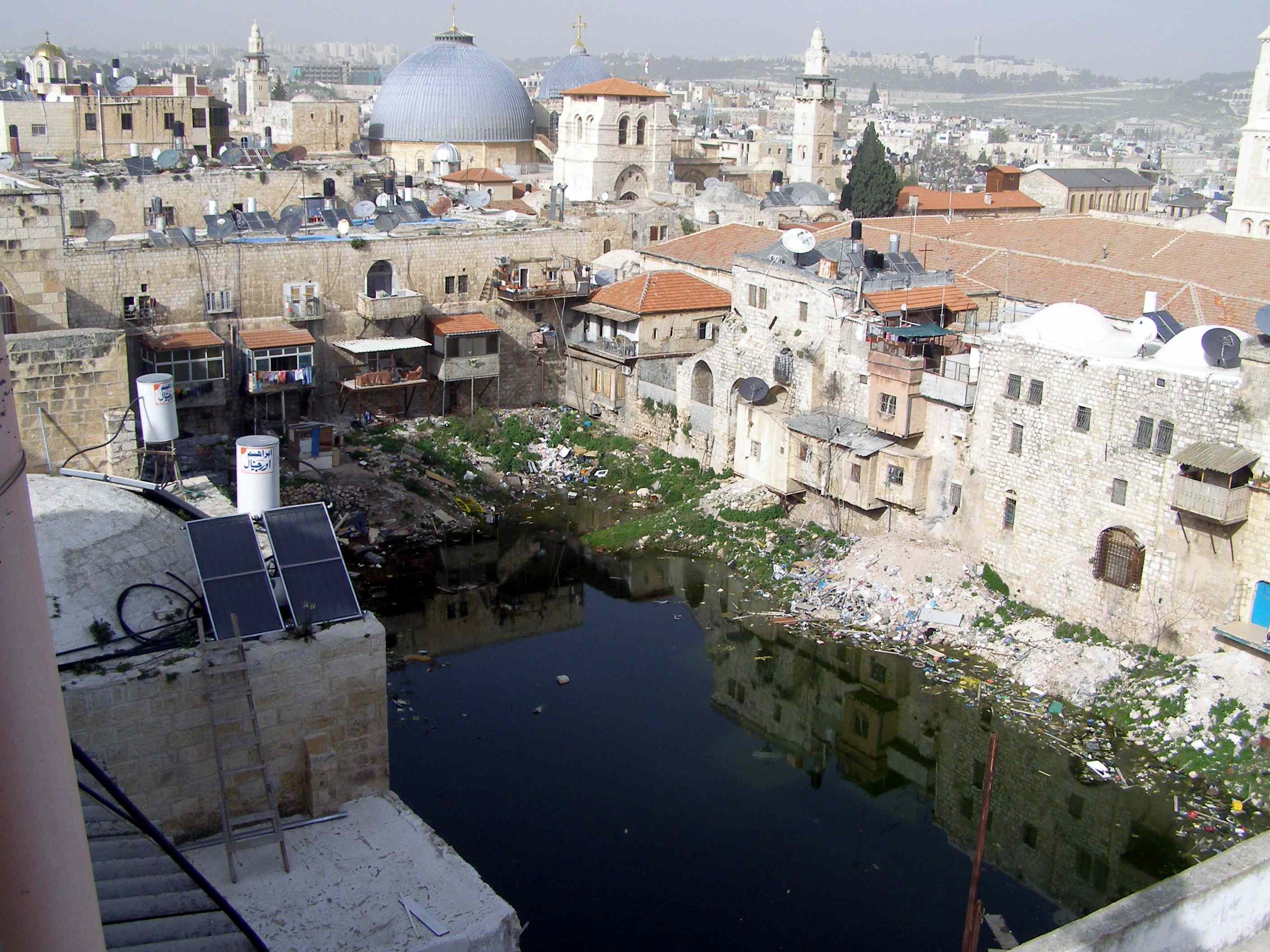Hezekiah's Pool on:
[Wikipedia]
[Google]
[Amazon]
 Hezekiah's Pool (, ''Brikhat Hizkiyahu''), or the Patriarch's Pool, located in the
Hezekiah's Pool (, ''Brikhat Hizkiyahu''), or the Patriarch's Pool, located in the
 Hezekiah's Pool (, ''Brikhat Hizkiyahu''), or the Patriarch's Pool, located in the
Hezekiah's Pool (, ''Brikhat Hizkiyahu''), or the Patriarch's Pool, located in the Christian Quarter
The Christian Quarter (Hebrew: הרובע הנוצרי, romanized: ''Ha-Rova ha-Notsri;'' ) is one of the four quarters of the walled Old City of Jerusalem, the other three being the Jewish Quarter, the Muslim Quarter and the Armenian Quarte ...
of the Old City of Jerusalem
The Old City of Jerusalem (; ) is a walled area in Jerusalem.
In a tradition that may have begun with an 1840s British map of the city, the Old City is divided into four uneven quarters: the Muslim Quarter, the Christian Quarter, the Arm ...
, was once a reservoir
A reservoir (; ) is an enlarged lake behind a dam, usually built to water storage, store fresh water, often doubling for hydroelectric power generation.
Reservoirs are created by controlling a watercourse that drains an existing body of wa ...
forming part of the city's ancient water system.
History
Flavius Josephus
Flavius Josephus (; , ; ), born Yosef ben Mattityahu (), was a History of the Jews in the Roman Empire, Roman–Jewish historian and military leader. Best known for writing ''The Jewish War'', he was born in Jerusalem—then part of the Judaea ...
referred to the pool as Amygdalon, meaning 'almond tree' in Greek
Greek may refer to:
Anything of, from, or related to Greece, a country in Southern Europe:
*Greeks, an ethnic group
*Greek language, a branch of the Indo-European language family
**Proto-Greek language, the assumed last common ancestor of all kno ...
, but it is very likely that he derived the name phonetically from the Hebrew
Hebrew (; ''ʿÎbrit'') is a Northwest Semitic languages, Northwest Semitic language within the Afroasiatic languages, Afroasiatic language family. A regional dialect of the Canaanite languages, it was natively spoken by the Israelites and ...
word ''migdal'', meaning 'tower', thus it is believed that the original name was Pool of the Tower or Towers. The pool is also known as the ''Pool of Pillars'', or the ''Pool of the Patriarch's Bath'' (Arabic: ''Birkat Hammam el-Batrak'').
The pool is believed to be the upper pool referred to in the Books of Kings
The Book of Kings (, ''Sefer (Hebrew), Sēfer Malik, Məlāḵīm'') is a book in the Hebrew Bible, found as two books (1–2 Kings) in the Old Testament of the Christian Bible. It concludes the Deuteronomistic history, a history of ancient Is ...
(), built by King Hezekiah
Hezekiah (; ), or Ezekias (born , sole ruler ), was the son of Ahaz and the thirteenth king of Judah according to the Hebrew Bible. Harris, Stephen L., ''Understanding the Bible''. Palo Alto: Mayfield. 1985. "Glossary", pp. 367–432
In the Bi ...
, who met messengers from the king of Assyria
Assyria (Neo-Assyrian cuneiform: , ''māt Aššur'') was a major ancient Mesopotamian civilization that existed as a city-state from the 21st century BC to the 14th century BC and eventually expanded into an empire from the 14th century BC t ...
there. At a later time it was fed from the Mamilla Pool, one of the three reservoir
A reservoir (; ) is an enlarged lake behind a dam, usually built to water storage, store fresh water, often doubling for hydroelectric power generation.
Reservoirs are created by controlling a watercourse that drains an existing body of wa ...
s constructed by Herod the Great
Herod I or Herod the Great () was a History of the Jews in the Roman Empire, Roman Jewish client king of the Herodian kingdom of Judea. He is known for his colossal building projects throughout Judea. Among these works are the rebuilding of the ...
during the first century BCE by an underground conduit which still partially exists.
The pool is by in size, with an estimated capacity of nearly . The bottom of the pool is cemented and leveled natural rock.The Land of Israel; A Text-Book on the Physical and Historical Geography of the Holy Land Embodying the Results of Recent Research, Robert Laird Stewart, 2008. Page 178 the pool is dry and surrounded by buildings on all sides.
References
External links
* * {{Authority control Buildings and structures completed in the 8th century BC Buildings and structures completed in the 7th century BC Reservoirs in Jerusalem Herod the Great Classical sites in Jerusalem Establishments in the Kingdom of Judah Hezekiah Books of Kings Christian Quarter